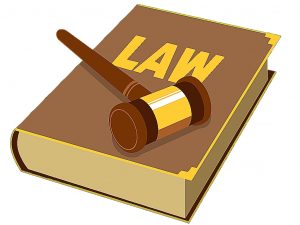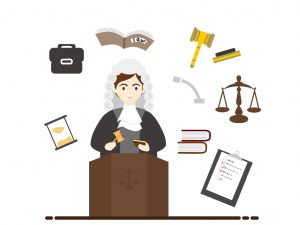The Principles Of Natural Justice: The principle of natural justice is an unwritten principle that is based on natural ideals and values which are considered to be universal. Natural justice implies fairness, equality and that which is reasonable. The principle of natural justice is goal driven to ensure law with fairness and to ensure that justice is attained unquestionably. It follows therefore that the principle of natural justice flows naturally.
The rule that no person shall be a judge in his own cause, and that all sides must be heard, are natural causes which flows ordinarily from the existence of humanity, although nowadays the principles are being encoded in a written law due to how sacrosanct they are. Principles of natural justice are matters of procedure. They are procedural rights which every individual is entitled to before any judicial or administrative setting. The principles are so fundamental; its non compliance goes to the root of the outcome.

Recommended: How to become a successful Lawyer
There are two universal principles of natural justice namely:-
- Audi Alteram Partem (Hear the both sides)
- Nemo Judex in Casa Sua (that no person shall be a judge in his own cause)
These two principles must be strictly adhered to in any judicial or administrative setting; otherwise the acts done would be a nullity.
Audi Alteram Partem
This heading of the principle entails that in a judicial setting, both sides must be heard. None shall be heard in the absence of the others and that both parties must be given equal opportunity to present their case. This principle also entail that no person shall be condemned, held liable or convicted without being heard. The principle of audi alteram partem is also fundamental that every judicial body must observe it; otherwise, the act performed would be null and void and liable to be overturned by the court.

There has seen cases where the court intervened for non compliance with this principle. In the case of RIDGE V BALDWIN, the Plaintiff was dismissed from his place of work by his employer without being heard. The court was very quick to declare his dismissal a nullity on the ground of non compliance with the principle of audi alteram partems.
Recommended: How to think and argue like a lawyer
In OGUNDOYIN V ADEYEMI, the court struck out the applicant’s case because according to the counsel, they were unaware that the matter was coming up that day. On appeal, to the Supreme Court, the court held that the Court of Appeal did not afford the parties an opportunity to be heard.
Fair hearing also entails that the judicial body hearing any matter must be free from bias, parties involved must be given notice of the nature of their case, and that the response in respect of their must be duly received and considered. Thus, in the court system, processes must be duly served on the parties before the matter is heard, except where service is impossible and substituted service becomes an option.
Another instance of the application of audi alteram partem principle is on the issuance of notice for land revocation, where the Governor of a state seeks to acquire one’s land for public purpose, notice of revocation must be properly served on that person, otherwise the revocation would be declared nullity. The purpose of the issuance of notice is to afford the person an ample opportunity to contest the purpose of the land acquisition if he perceives that it is not for public purpose. This rule is also applicable in a lease agreement.
Recommended: How to become a successful business woman
The principle of audi alteram partem was also implicated in the case of GARBA V UNIVERSITY OF MAIDUGURI. In this case, certain students were expelled from the University for their Alleged Involvement in riot which led to the destruction of school properties.
The Disciplinary Tribunal and the investigating panel set up by the school management did not afford them the opportunity to call in their witnesses to testify in their favour, even when they indicated that they have witnesses. They were also not allowed to cross-examine the witnesses who gave evidence against them. The court overturned the decision of the tribunal and reinstituted them back to school, holding that their right to be heard was breached by the tribunal.
Another application of the audi alterem partem principle is on criminal trials. In a criminal trial, an accused person must be informed of his charges and must be given the chance to take the plea of guilty or not guilty. He is to be presumed innocent until proven guilty pursuant to S.36 (5) of the constitution. Deeming an accused person guilty is an outright breach of the audi alteram partem principle. The principle of audi alteram partem is the basis of fair hearing which is the only absolute right recognized in the constitution. Thus it has no limitations. The principle must be observed at all times.

Recommended: Most Capitalist Countries In The World 2022
Nemo Judex in Casa Sua
This is the second limb of the principles of natural justice. The Latin phrase implies that no person shall be a judge in his own cause. The principle entails that no one should be an accuser, complainant or prosecutor and at the same time be the judge in that same matter. This extends to clear its meaning that a judge should not hear a matter which he has interest in, or that which by one way or the other relate to him.

Non compliance with this principle of Nemo Judex in Casa Sua has in the past received judicial pronouncements. Thus in the case of GARBA V UNIVERSITY OF MAIDUGURI, the Deputy Vice Chancellor of the institution was the chairman of the Disciplinary Investigation Board. He was also a victim of the riot which the board was investigating since his properties were among those destroyed. The court held that this was clearly in breach of the principle of Nemo Judex in Casa Sua, as the Deputy Vice Chancellor was a complainant, a prosecutor and the judge in his own cause.
Recommended: How To Become Good At Physics: 12 Effective Ways
Also in the case of DR. ALAKIJA V MEDICAL DISCIPLINARY COMMITTEE, the Medical Tribunal held against Dr. Alakija that his name be suspended from the Medical Practitioners Register. On Appeal, the Appellant showed that the registrar at the tribunal, who was the prosecutor, was also part of the Investigating Tribunal. The Supreme Court held this to be in violation of the principle of Nemo Judex in Casa Sua.
Similarly in the case of LEGAL PRACTITIONERS DISCIPLINARY COMMITTEE V FAWEHINMI, the Attorney General of the Federation who was the prosecutor before the tribunal in this matter was also the chairman of the Investigation Panel. The Supreme Court held this to be in contravention of the principle of Nemo Judex in Casa Sua.
It follows therefore that one would be held to be in breach of the principles of natural justice if any circumstance points to the likelihood of bias ad impartiality in any matter. It was held in METROPOLITAN PROPERTIES CO V LANNAN that there need not be actual bias; any reasonable suspicion of bias is sufficient to contravene the principle of natural justice.
Recommended: How to Write a Legal Article
Conclusion
The principles of natural justice are highly sacrosanct. The courts are ever ready to nullify any judicial or administrative act done in contravention of the principles of natural justice. It is the only constitutional right that has no limitation; it applies absolutely.

Edeh Samuel Chukwuemeka, ACMC, is a lawyer and a certified mediator/conciliator in Nigeria. He is also a developer with knowledge in various programming languages. Samuel is determined to leverage his skills in technology, SEO, and legal practice to revolutionize the legal profession worldwide by creating web and mobile applications that simplify legal research. Sam is also passionate about educating and providing valuable information to people.